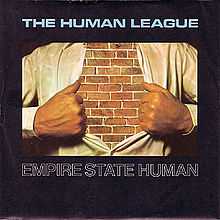Empire State Human
| "Empire State Human" | ||||
|---|---|---|---|---|
 | ||||
| Single by The Human League | ||||
| from the album Reproduction | ||||
| B-side | "Introducing" | |||
| Released |
12 October 1979[1] June 1980 (re-release) | |||
| Format | 7", 12" Vinyl Single | |||
| Recorded | Monumental Studios, Sheffield | |||
| Genre | Electronic, new wave | |||
| Length | 4:36 | |||
| Label | Virgin | |||
| Writer(s) | Philip Oakey, Martyn Ware, Ian Craig Marsh | |||
| Producer(s) | Colin Thurston | |||
| The Human League singles chronology | ||||
| ||||
 |
Empire State Human
|
| Problems playing this file? See media help. | |
"Empire State Human" is a song by the British synthpop group The Human League. The song was written by Philip Oakey, Martyn Ware and Ian Craig Marsh. It was produced by Colin Thurston, and recorded at Monumental Studios in Sheffield.[2] It was used in the 2012 video game Lollipop Chainsaw in a minigame for the retro stage, and also featured on the game's original soundtrack.
The song was the third single to be released by the original line-up of the Human League, and the first and only single from the band's 1979 debut album Reproduction. Upon its first release in October 1979, the single failed to chart. However, it was re-released in June 1980 and fared slightly better, reaching number 62. For the re-release, Virgin Records included a free copy of the single "Only After Dark" with the first 15,000 copies as a sweetener.
Lyrically, "Empire State Human" is a song about becoming powerful using the analogy of size, with Oakey declaring that he wants to be "tall" a total of 60 times in 3 minutes. Uncut magazine drew a comparison with Oakey's own personal ambition:
| “ | "I wanna be tall, tall, tall, as big as a wall, wall, wall". Oakey's Nietzschian pop fantasy reflected his own burgeoning full-on pop ambitions...[3] | ” |
The B-side, "Introducing", is an instrumental. Oakey sang on the original recording but the vocals were not used on the released version. [2]
The open shirted man on the cover artwork is in fact Ian Craig Marsh's father.[2]
References
External links
- http://www.the-black-hit-of-space.dk/empire_state_human.htm
- http://www.blindyouth.co.uk/
- Full lyrics of this song at MetroLyrics